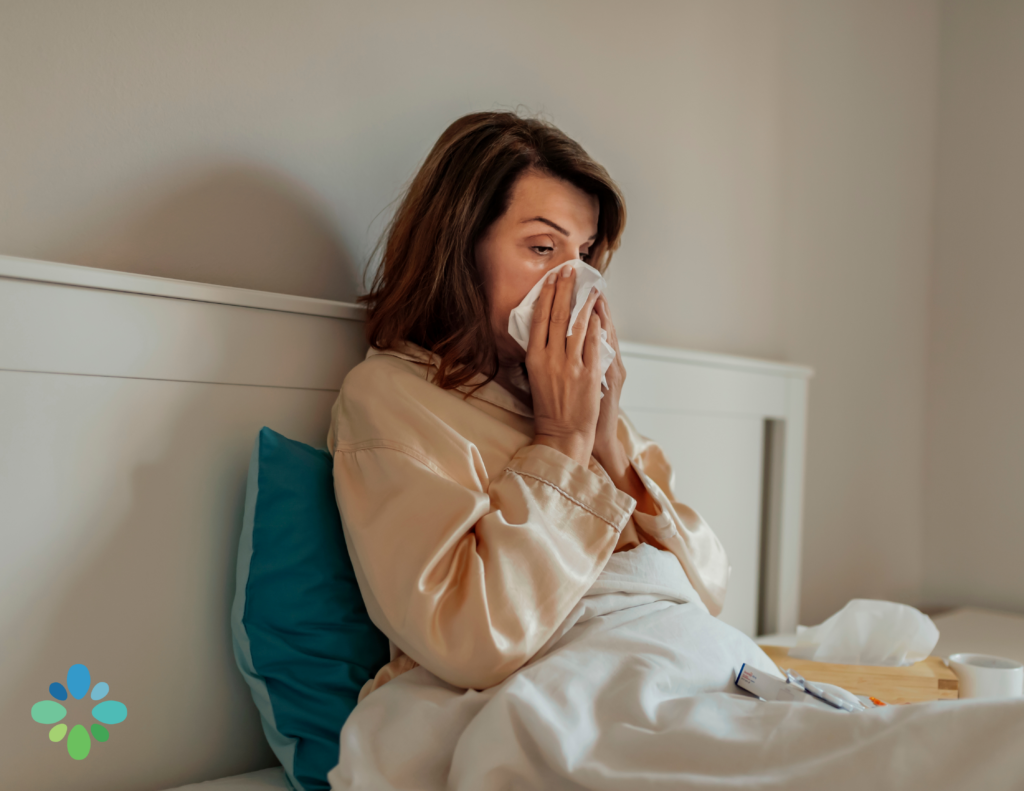Why Am I Always Sick? Building Immune Resilience

Why Am I Always Sick? Building Immune Resilience
When it comes to health, one of the most intriguing questions we face in our office is: "Why am I always sick?" Understanding the concept of immune resilience can shed light on why individuals, even those living in the same environment, often have varying responses to the same toxins, allergens, and pathogens. This blog explores the importance of immune resilience, the factors contributing to different reactions, and how food intolerances like gluten, dairy, and soy play a role in immune strength.
What is Immune Resilience?
Immune resilience refers to the body's ability to withstand and adapt to various stressors, including infections, toxins, and allergens, without succumbing to illness. A resilient immune system can effectively identify and eliminate pathogens, repair damaged tissues, and return to a state of balance. If you find yourself wondering, "Why am I always sick?", improving immune resilience might be the key.
Factors influencing immune resilience include genetics, lifestyle choices, nutrition, stress levels, and environmental exposures. While some aspects, like genetics, are beyond our control, many other factors can be managed to enhance immune strength and resilience, helping you answer, "Why am I always sick?"
Why Different People Have Different Reactions
One of the fascinating aspects of immune resilience is how differently people can react to the same environmental and dietary exposures. Even within the same household, individuals may experience varying degrees of illness or none at all. If you often think, "Why am I always sick while others around me aren't?", several key factors contribute to these differences:
Genetic Predisposition
Genetics play a significant role in determining how our immune system responds to various stimuli. Certain genetic variations can make individuals more susceptible to specific infections, autoimmune conditions, or allergies. For example, variations in the HLA gene complex can influence how the immune system recognizes and responds to pathogens, which might explain why you are always sick while others are not.
Microbiome Diversity
The microbiome, consisting of trillions of microorganisms living in and on our bodies, plays a crucial role in immune function. A diverse and balanced microbiome can enhance immune resilience by outcompeting harmful pathogens and modulating immune responses. Factors such as diet, antibiotic use, and exposure to different environments can impact microbiome diversity, leading to variations in immune strength and answering why you are always sick compared to others.
Lifestyle and Stress
Lifestyle choices, including diet, physical activity, sleep, and stress management, significantly impact immune resilience. Chronic stress and poor lifestyle habits can weaken the immune system, making individuals more susceptible to illness. Conversely, a healthy lifestyle can boost immune strength and resilience. If you're asking, "Why am I always sick?", assessing your lifestyle and stress levels might provide insights.
Nutritional Status
Adequate nutrition is essential for a robust immune system. Nutrient deficiencies can impair immune function and increase susceptibility to infections. For instance, deficiencies in vitamins A, C, D, and zinc are known to compromise immune resilience. A well-balanced diet rich in fruits, vegetables, lean proteins, and healthy fats can support optimal immune function, which can help answer the question, "Why am I always sick?"
Environmental Exposures
Exposure to toxins, pollutants, and allergens can vary widely among individuals. While some people may have a high tolerance for certain environmental factors, others may react adversely. For example, exposure to mold or chemical pollutants can trigger immune responses in some individuals, leading to symptoms such as respiratory issues, fatigue, and inflammation. These factors can contribute to why you are always sick.
ARTICLE CONTINUES BELOW
Schedule a Consultation TODAY!
We would love to sit down with you and chat about your experiences and current pain points.
Food Intolerances and Immune Strength
Food intolerances, such as those to gluten, dairy, and soy, can significantly impact immune resilience. These intolerances occur when the immune system mistakenly identifies certain proteins in foods as harmful, leading to inflammation and other adverse reactions. If you're often sick, food intolerances might be playing a role.
Gluten Intolerance
Gluten intolerance, including celiac disease and non-celiac gluten sensitivity, affects a subset of the population. In individuals with celiac disease, gluten consumption triggers an autoimmune response that damages the lining of the small intestine. This can lead to nutrient malabsorption, gastrointestinal symptoms, and systemic inflammation, compromising immune resilience and explaining why you are always sick.
Dairy Intolerance
Lactose intolerance and dairy protein allergies are common forms of dairy intolerance. Lactose intolerance results from a deficiency in lactase, the enzyme needed to digest lactose, leading to gastrointestinal symptoms. Dairy protein allergies involve an immune response to proteins like casein and whey, causing inflammation and potentially severe allergic reactions. These conditions can answer why you are always sick.
Soy Intolerance
Soy intolerance can cause digestive issues, skin reactions, and other symptoms in sensitive individuals. The immune system's reaction to soy proteins can lead to chronic inflammation and a weakened immune response, contributing to why you are always sick.
Patient Success Story: Building Immune Resilience
Meet Chris, a 35-year-old man who struggled with recurrent infections, chronic fatigue, and digestive issues for years. Despite living in a relatively healthy environment and following a balanced diet, he often found himself asking, "Why am I always sick?"
Chris sought help from us at Back On Track 2 Wellness. We conducted comprehensive testing to identify potential underlying causes of his health issues. The results revealed several factors impacting his immune resilience, including gluten intolerance, a disrupted microbiome, and chronic stress.
We developed a personalized treatment plan for Chris, focusing on enhancing his immune resilience. The plan included:
- Gluten-Free Diet: Eliminating gluten from Chris’ diet significantly reduced inflammation and improved his digestive health.
- Probiotic Supplements: To restore microbiome diversity, Chris began taking a high-quality probiotic supplement.
- Stress Management Techniques: Incorporating mindfulness practices, regular exercise, and adequate sleep helped reduce Chris’ stress levels.
- Nutritional Support: Ensuring adequate intake of essential vitamins and minerals through diet and supplements bolstered his immune strength.
Over several months, Chris experienced remarkable improvements in his health. His energy levels increased, infections became less frequent, and his overall well-being improved. By addressing the factors compromising his immune resilience, Chris regained control of his health and built a stronger, more resilient immune system, no longer asking, "Why am I always sick?"
Strategies to Enhance Immune Resilience
Building immune resilience requires a holistic approach that considers various aspects of health and lifestyle. Here are some effective strategies to enhance immune strength:
Maintain a Balanced Diet
A nutrient-rich diet is fundamental to immune resilience. Focus on consuming a variety of fruits, vegetables, whole grains, lean proteins, and healthy fats. Foods rich in antioxidants, vitamins, and minerals support immune function and protect against oxidative stress. Adding foods like berries, leafy greens, nuts, seeds, and fatty fish can provide the necessary nutrients to bolster immune resilience and prevent you from always being sick.
Prioritize Gut Health
Supporting gut health is crucial for immune resilience. Include probiotic-rich foods like yogurt, kefir, sauerkraut, and kimchi in your diet to promote a diverse and balanced microbiome. Prebiotic foods, such as garlic, onions, and bananas, nourish beneficial gut bacteria. Additionally, reducing the intake of processed foods and sugars can help maintain a healthy gut environment, reducing the likelihood of always being sick.
Manage Stress
Chronic stress can weaken the immune system, making it essential to adopt stress management techniques. Practices such as mindfulness meditation, yoga, deep breathing exercises, and regular physical activity can help reduce stress and enhance immune strength. Engaging in hobbies, spending time in nature, and connecting with loved ones can also contribute to lower stress levels and better immune health, reducing the frequency of always being sick.
Ensure Adequate Sleep
Quality sleep is vital for immune resilience. Aim for 7-9 hours of sleep per night to support optimal immune function. Establish a consistent sleep routine and create a restful sleep environment to improve sleep quality. Avoiding screens before bedtime, keeping the bedroom cool and dark, and maintaining a regular sleep schedule can enhance the quality of sleep, helping you avoid always being sick.
Stay Physically Active
Regular physical activity boosts immune resilience by promoting circulation, reducing inflammation, and supporting overall health. Engage in moderate exercise, such as walking, swimming, or cycling, for at least 150 minutes per week. Including strength training and flexibility exercises can further enhance physical and immune health, preventing you from always being sick.
Avoid Toxins
Minimize exposure to environmental toxins, such as pollutants, chemicals, and mold. Use natural cleaning products, improve indoor air quality, and consider water filtration systems to reduce toxin exposure. Reducing the use of plastic containers and avoiding heavily processed foods can also lower the intake of harmful chemicals, addressing the question of why you are always sick.
Hydrate Adequately
Staying well-hydrated is essential for maintaining immune resilience. Water helps flush out toxins, supports cellular functions, and keeps mucous membranes moist, which acts as a barrier against pathogens. Aim to drink at least 8 glasses of water a day, more if you're physically active or live in a hot climate. Proper hydration can help you avoid always being sick.
Conclusion: Embracing Immune Resilience
Understanding and enhancing immune resilience is crucial for maintaining health and well-being. By recognizing the factors contributing to immune strength and implementing strategies to support the immune system, individuals can improve their ability to withstand and recover from various stressors. Remember, even small changes in diet, lifestyle, and stress management can make a significant difference in building a resilient immune system and answering the question, "Why am I always sick?"
At Back On Track 2 Wellness, we are dedicated to helping individuals achieve optimal health through personalized, holistic approaches. If you find yourself wondering, "Why am I always sick?" consider exploring the factors affecting your immune resilience and taking proactive steps to strengthen your immune system. Together, we can build a foundation of health and vitality that supports you in every aspect of life.
Schedule Your Telehealth Consultation
We would love to sit down with you and chat about your experiences and current health complaints.
The information on this website has not been evaluated by the Food & Drug Administration or any other medical body. We do not aim to diagnose, treat, cure or prevent any illness or disease. Information is shared for educational purposes only. You must consult your doctor before acting on any content on this website, especially if you are pregnant, nursing, taking medication, or have a medical condition.

By Dr. Todd W. Bunning
Dr. Todd W. Bunning’s Chiropractic and Functional Medicine services reach far beyond the local Roseville area, with webcam consultations available for patients in any location. With over 21+ years of Private Practice experience, Dr. Todd continues to focus on the individual: science-based methods to address whole-body health factors.
Dr. Todd’s education didn’t stop when he graduated from Life West Chiropractic College in 2003. Today, he’s continuing to receive training and is chipping away on numerous post-graduate degree programs. This unique blend of clinical health investigation and Lifestyle Medicine application helps people of all ages find the underlying factors that result in chronic disease.